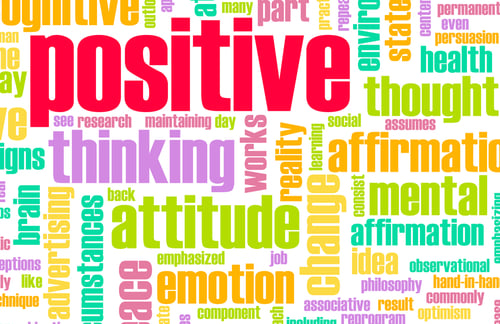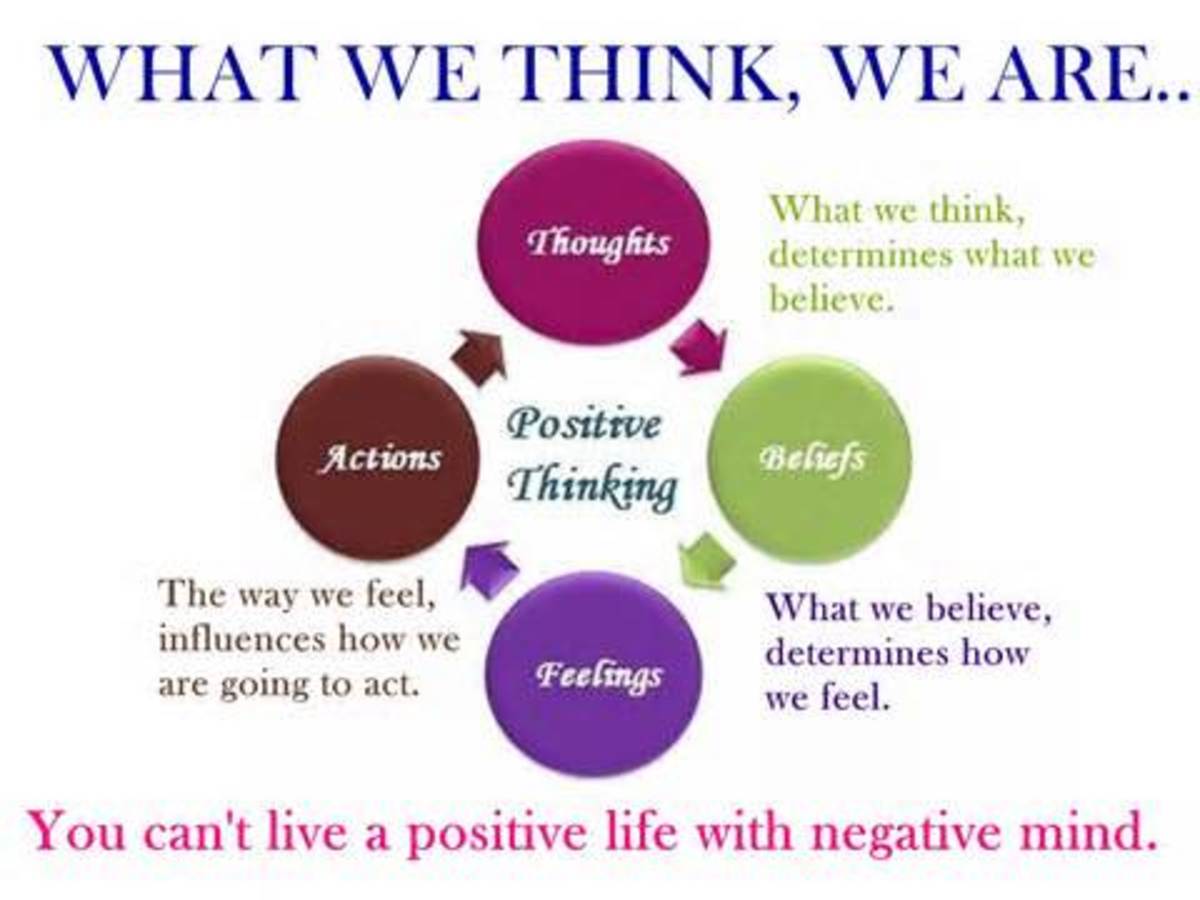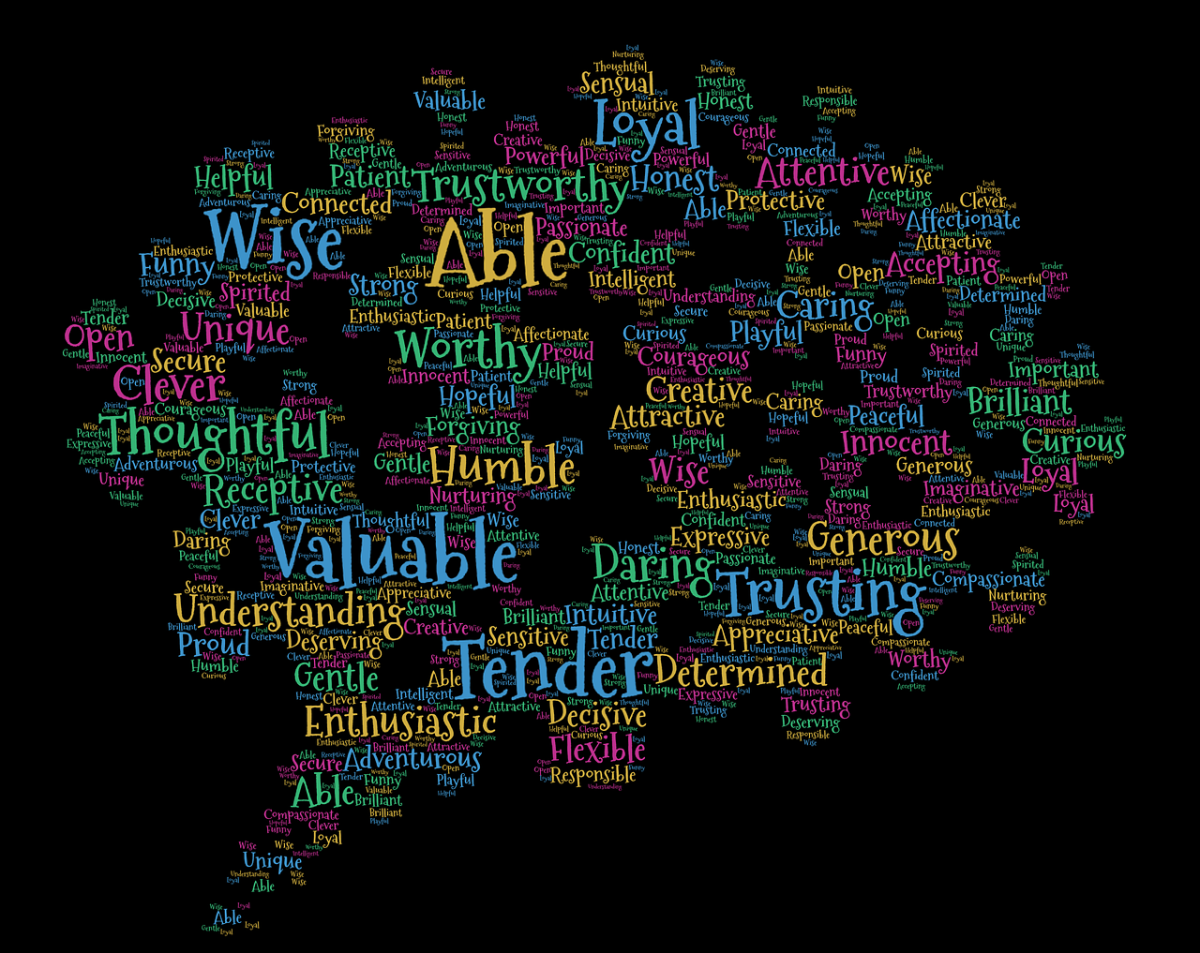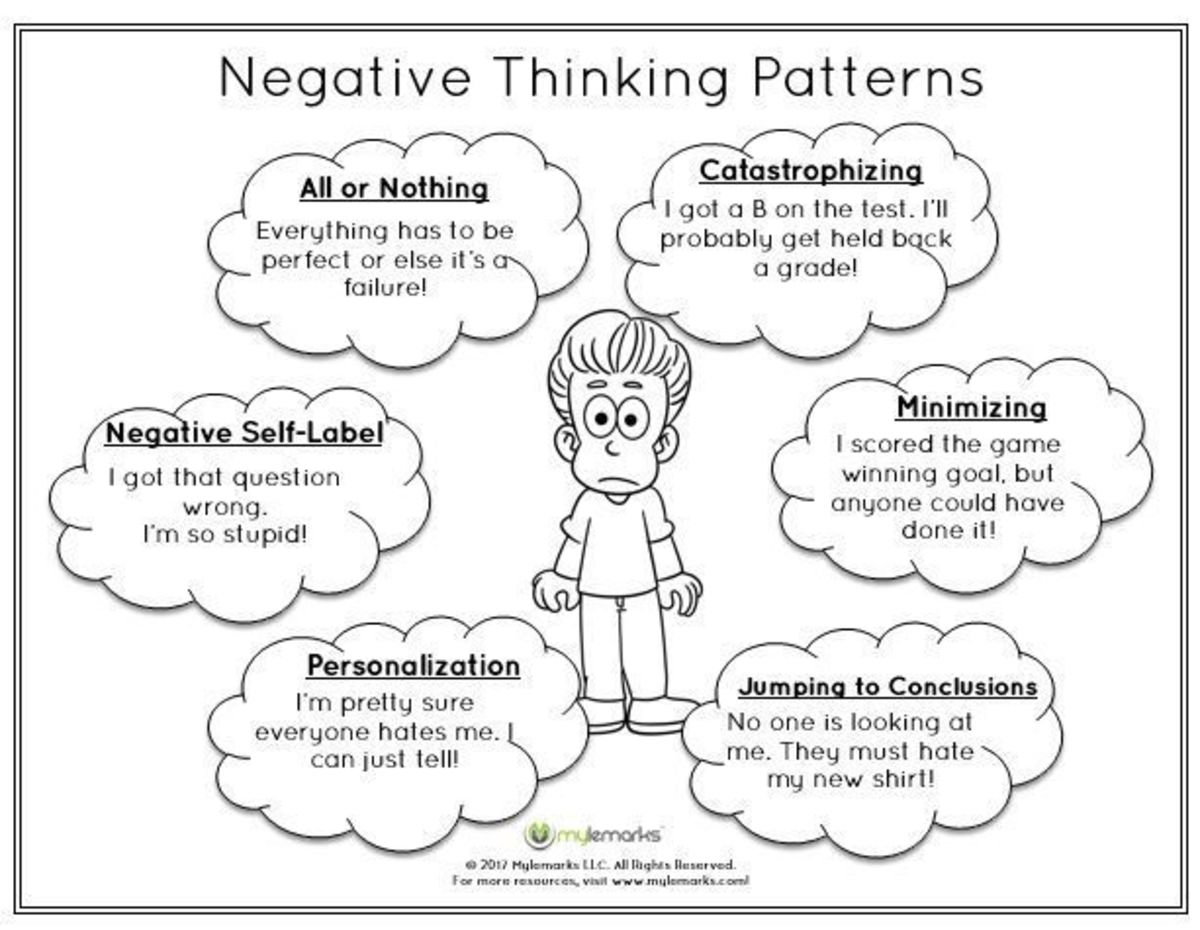- HubPages»
- Health»
- Personal Health Information & Self-Help»
- Mentally & Emotionally Balanced Living
Changing Negative Thinking Into Positive Thinking
Positive Thinking

Negative Thinking
Our thoughts dictate our behavior. Negative thinking can cause an overall feeling of negativity within a person. Their mood, their reactions, and their perspective can be influenced by negative thinking.
CBT - Cognitive Behavior Therapy is a form of psychological treatment that has shown to be very effective for many types of emotional issues that affect people seeking treatment. The basis of CBT is that way you feel affects the way you think and the way you act. The idea behind this theory is that happiness comes from healthy mindedness.
CBT helps turn our core beliefs into helping beliefs that enable and empower those who seek this type of treatment to adapt to reality and develop and pursue an improved quality of being.
By changing unhealthy ways of thinking and behaving, CBT is helpful in looking at situations in ways that can create a more positive outcome.
Cognitive Behavior Therapy
By changing unhealthy ways of thinking and behaving, CBT is helpful in looking at situations in ways that can create a more positive outcome.
CBT has been tested and developed through many scientific studies that have proven its effectiveness.
Cognitive Behavior Therapy works well for a wide range of problems:
-
addiction
-
anger
-
anxiety and panic disorder
-
BDD body dysmorphic disorder
-
depression
-
eating disorders
-
OCD obsessive compulsive disorder
-
personality disorders
-
phobias
-
PTSD post traumatic stress disorder
-
relationship and social problems
CBT is designed to give you tools that will help you develop a focused approach.
a= activating or actual event - what triggered your emotions
b= beliefs= what went through your mind and what meaning did it have to you
c= consequence of behavior - how did you act when you felt this emotion
This type of therapy uses the ‘‘abc’’ approach to help recognize and sort out emotional issues that we may be dealing with
Cognitive Behavior Therapy helps individuals to understand that feeling leads to thinking, which leads to action. The meaning you give an event affect your emotional response. CBT will help you understand that the way you feel is not because someone made you feel that way, but because there was a meaning you assigned to the other person’s behavior that caused a feeling within to come out. Whatever meaning or belief you assign to people you interact with and events that happen will touch an emotion in you and cause you to react based on this emotion.
Positive events create positive feelings. Negative events lead to negative feelings. Perception plays a role in what we view as positive or negative. So if our view of something is negative, but not necessarily realistic, or accurate, it can lead to feelings that are unnecessarily hindering, because of faulty thinking.
By looking at the relationship between our thoughts, and feelings, and behavior, and looking at patterns of thinking that lead to negative, self destructive acts, individuals can learn to redirect their thoughts and change their patterns of thinking that will lead to better ways to cope.
Become More Positive

Learn to Look at Things Differently
CBT therapists are problem focused and purpose directed. Often there is homework to do outside of the session to challenge faulty thinking and irrational beliefs. It is a good idea to write down automatic thoughts, the concepts that just pop into your mind
Furthermore, people who are participating in CBT are encouraged to monitor and write downthe thoughts that pop into their minds (called "automatic thoughts"). This allows the patient and their therapist to search for patterns in their thinking that can cause them to have negative thoughts which can lead to negative feelings and self-destructive behaviors.
When we process information in a biased way, we ignore information that doesn’t fit our long held beliefs. We only acknowledge information that fits with the truths we believe. If you take in information that fits with negative thinking, then negative thinking gets reinforced. Some people have no mental place for processing positive information. This happens very often with people who can’t easily accept compliments.
Cognitive Behavior Therapy helps people to change the way they think about things so that a person can acknowledge their own good points. A negative belief system discounts and distorts positive experiences and positive qualities about themselves.
CBT teaches people to look at things in a less negative way, by changing their negative thought patterns. CBT also uses practical real life habits, like working on improving sleep to help a person deal with their depression or bipolar disorder.
Cognitive Behavior Therapy helps individuals identify, challenge, and replace negative thinking, which is unhelpful and counterproductive.
Challenge Your Thinking
What you think affects what you feel and what you do. The key to feeling better about yourself is to change those unhelpful thoughts. By making a thought to feeling link, you can draw a connection your thoughts and your emotions are. Awareness of this connection will help you recognize the thoughts to challenge, and to realize the reason to change your thinking.
As you become less subjective and more objective, you may see that what you automatically mistook as facts, were merely hunches, theories or non concrete ideas that may have little or no basis.
There is a tremendous correlation between how you feel and how much negative meaning you give the event. The more negative the meaning, the more negative the event. Feeling negative, makes you think more negatively. By generating more negative thoughts a vicious cycle of negativity begins.
As you look closely at your negative thoughts, here are some questions to ask yourself:
- Can you prove these thoughts are true?
-
How is your thinking affecting you?
-
Are these thoughts really logical?
-
Would other people think these thoughts are realistic?
-
Is there evidence that counters these thoughts?
-
Am I thinking in extreme terms, or are my thoughts balanced?
-
Is my thinking flexible or rigid?
-
Are my thoughts objective and realistic?
-
How are my thoughts influencing my feelings?
-
What is a more helpful way to look at things?
-
What do I need in order to think and act differently.
Sometimes, trying to use logic to disprove a negative pattern of behavior, doesn’t always work for some people. In cases like this, it may be effective to an alternative way of looking at the situation so that you are not solely blaming yourself or solely blaming someone else.
Productive and healthier thinking can only happen with more positivity. The idea behind cognitive behavior therapy is that when people change their negative ways of thinking, they will attain more happiness by thinking positive.
CBT also attempts to get people to understand where they are focusing their attention. How you manage our thoughts, together with being mindful about what you think about can be an effective way of dealing with problematic thinking.
Mindfulness

Mindfulness
Thoughts are not the real problem. It is always the meaning that you attach to these thoughts. People with emotional issues over focus on and attach unhelpful meanings to the people around you and your surroundings. Understanding this can help you change your thinking patterns and actually create a better mood for yourself by reducing anxiety and thinking about things in a different light. Focusing your attention towards what is going on around you, instead of inside you, is an effective way to feel less anxious. Anxiety often comes from being too self focused.
Mindfulness techniques can sometimes work to keep depression away also. By being in the moment and concentrating on what you are feeling right now, not emotionally, but through your senses, and your environment. Take the time to concentrate on what is happening around you right now.
There are many benefits to gaining an understanding about your emotions and how they influence your thought processes. Sometimes your thinking is helpful, sometimes it is not. Learning to tell the difference is an important part of being mindful. When you experience your thoughts with little judgement, they will not as easily affect your actions and behavior and, cause you distress, or hinder your feelings and behavior.
After a time you will start to become familiar with the thoughts that come to you when you are feeling down, anxious, guilty, and not let them infiltrate your mood.
People with more severe depression and anxiety may benefit from working with a professional counselor. Some thoughts like harming oneself, or OCD, may be intrusive enough and are not be ignored. Distressing thoughts can cause unpleasant and uncomfortable feelings that need attention, rightfully so.
Unwelcome thoughts, are just thoughts. Whatever you do to help yourself deal with them, will be helpful to you mentally and emotionally in the long and short run. Your negative thinking does not have to rule the things you do and the way you react.
Positive Thinking
As you work towards changing your thinking, be kind to yourself. Acknowledge that your thoughts are causing you suffering and help yourself to make these positive changes.
Not all thoughts are valid. It is very important to be able to tell the difference. Be kind to yourself as you learn new behaviors and new ways to manage your thoughts. Little steps pave the way for big changes.
Cognitive behavior therapy is one of many ways to deal with negative thinking and irrational thoughts. Through self awareness and learning to not be judgemental about your thoughts, thinking patterns and your reaction to them can change for the better.
Empower yourself with positive thinking and and you will be able to embrace the world in a new way that will offer you less distress and greater happiness.









